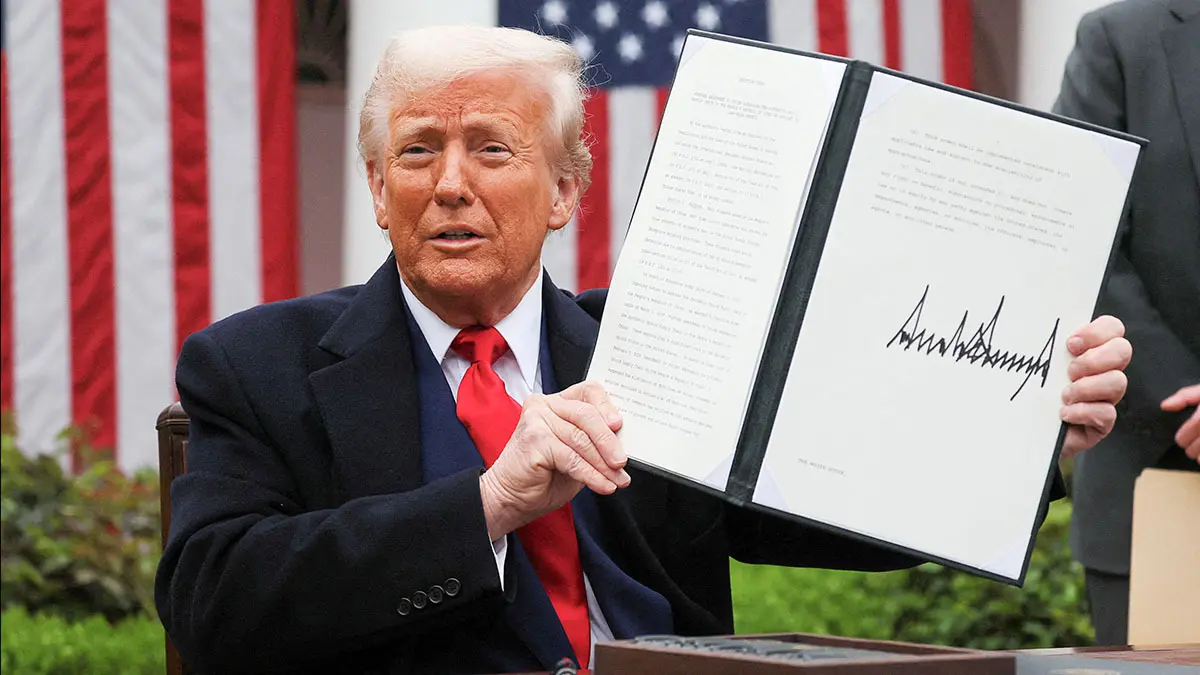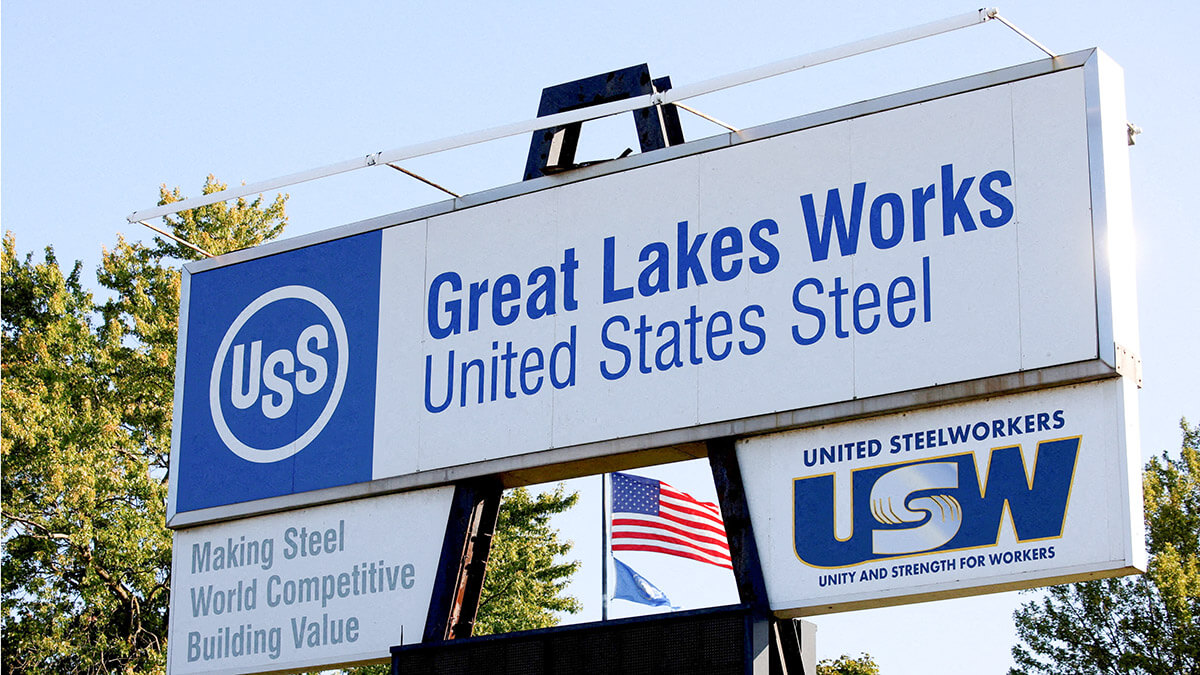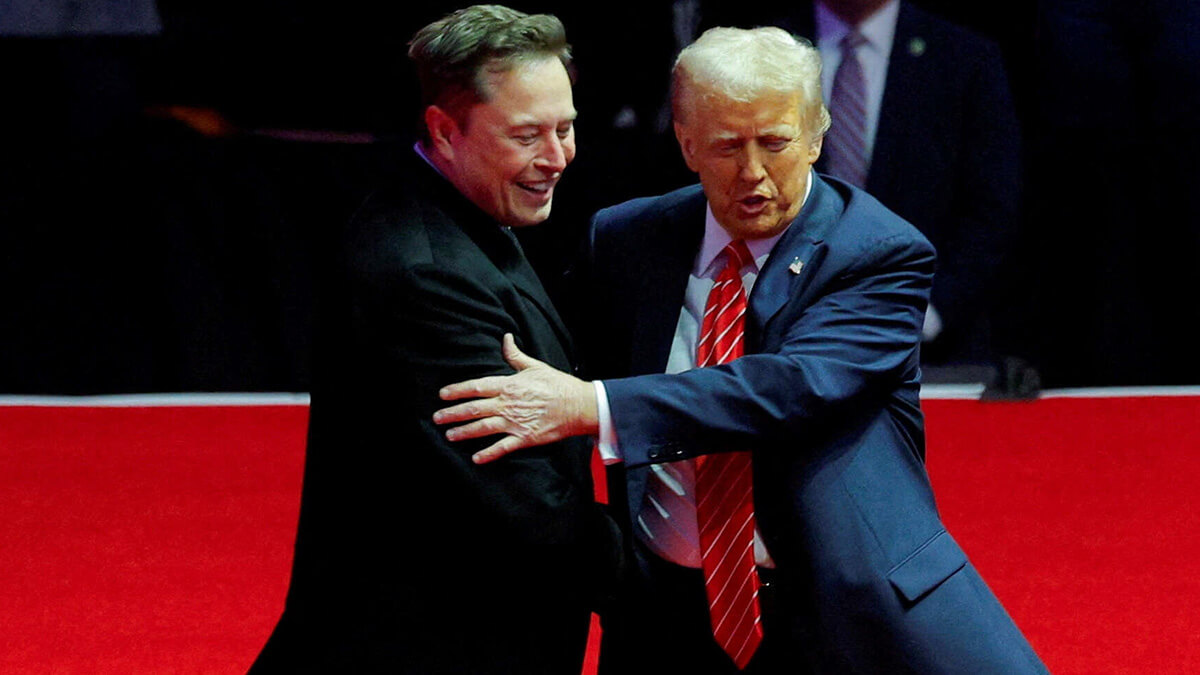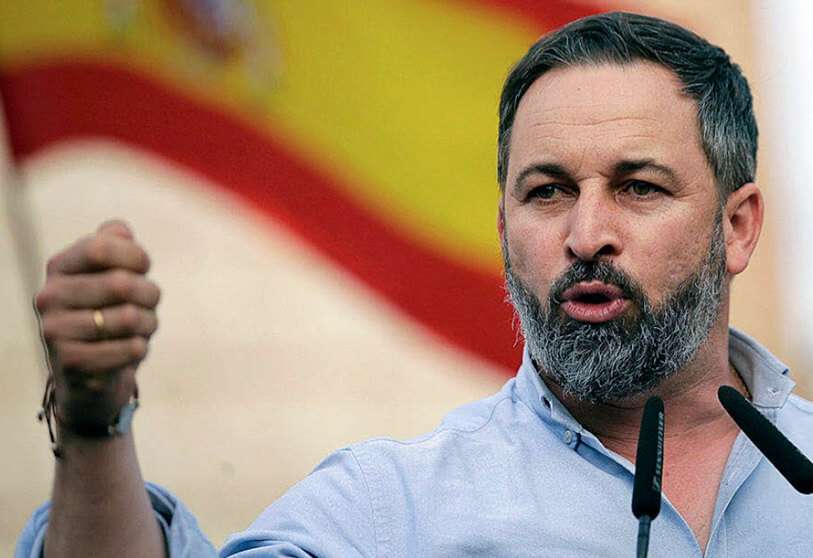Gustavo de Arístegui: ‘Trump is not a negotiator, he is a businessman, and the world is going to pay the consequences’

In the latest instalment of ‘De cara al mundo’ on Onda Madrid, we were joined by Gustavo de Arístegui, diplomat and international analyst, who reviewed the international economic consequences of the application of the new tariff policies announced by the US government, which will affect the whole world.
Mr Gustavo de Aristegui, let's talk about Trump and the international shock caused by the new tariff policy that is going to be applied to every country in the world.
We could summarise the measures of the President of the United States, Donald Trump, in a single word: stupefaction. It is to stupefy, on the contrary, the ally with whom he sits down to negotiate, to throw him completely off balance and raise issues with him that would never have been accepted otherwise.
Having said that, I'm going to quote a friend of mine who told me that Trump presents himself as a negotiator and in reality he is a businessman and they are not the same thing. And I think the difference is very brilliant. Everything we are seeing is more businessman than negotiator.
A negotiator does not propose a negotiation to see if from 100 to 0 I can get 90 to 10, because that is not going to happen. World trade is an extraordinarily delicate issue, to the point that countries opposed to what we might call the liberal order or world stability, or that try to disrupt peace, order and stability in different parts of the world, but when it comes to international trade they do their utmost to follow the norm because they know that any issue that means the slightest deviation from a certain orthodoxy will affect them first. And that means that, for example, the international market leaves you out.
Countries that are extraordinarily destabilising, such as Iran, know what effect that has when they leave your oil out of the international market. But in the worst moments of the oil embargoes against Iran, all the other goods that Iran has been exporting to the world, antique or new carpets, or caviar, for example, which is even advertised in Spanish department stores, has not been the slightest bit disrupted until now. And this means that international trade is terminally ill.
If it is not given exactly the treatment it needs, instability could take hold in international trade, in the economy and in geo-economics for a long time to come. I will finish with a sentence and a comment on this part. Let's not forget that even if the tariffs last four or five months until a hypothetical agreement is reached between Trump and his counterparts, the effects will begin to be felt and will last for many years because it takes much longer to reverse the negative effects of a tariff war and non-tariff barriers.

Gustavo, Mr Trump here, partners, allies, friends, enemies, regulars, but if you analyse the situation carefully, Trump's main target is China and those countries, such as Vietnam, that China uses to export to the United States.
Without a doubt, the problem is that he is applying absolutely excessive tariffs to countries that are allies, such as a large part of the European Union, to Latin American countries that have formed part of the dense network of economic interests that links or establishes very deep connections between the United States and Latin America, or countries in Asia. Let's not forget that there are issues that are incomprehensible.
You can, without a doubt, protect a certain part of your industry, but to impose, for example, tariffs on the aluminium industry that the United States practically does not have, what are you going to do? Set it up? And how long does it take to set up an aluminium industry in the United States? Years! And, consequently, who are you hurting? Your own consumers of foreign steel and aluminium.
Just this morning on the BBC I was listening to the desperate comments of some small businessmen in the American Middle East and they were saying that they had to buy steel components from countries in Europe and East Asia and at the same time they bought components made from steel. The man pointed out that some will be taxed at 30%, others at 24%, but there are components that have both and, consequently, I am going to pay for those components to build cars, motorbikes or components and I am being overcharged 54% and they are taking me out of the market. And this was an American. This is the real consequence of the problem.

Will the American economy be able to withstand this gamble? Will Trump's team manage the tsunami it has caused? Well, we are already seeing the consequences on the stock market.
A month ago, an important Spanish businessman, perhaps the most important Spanish businessman to have held a position in the multinational car companies and he is not the one we are thinking of, I am not from Renault, he is someone who was at Ford and Valeo and then Federal Mobile, a great friend of mine who lives in London, told me that there was a silent rebellion growing in volume among the most important businessmen in the United States, almost all of them Republicans and almost all of them contributors to the Trump campaign, saying that they were hitting their heads because of the constant ups and downs in his economic policies, today I give 20% to Mexico, tomorrow I take it away, today I give 20% to Canada, tomorrow I take it away, forgetting, for example, that Canada provides 60% of the imported foreign oil consumed by the United States of America.
So who is shooting themselves in the head of whom? As soon as these gentlemen say that they are reducing my fortune, in some cases by up to 50%, even your ally Elon Musk has seen Tesla lose 50% of its value, perhaps more, because I haven't seen the New York Stock Exchange reports in the last 48 hours, but it was at more than 50% loss of real value.
Therefore, his fortune, based essentially on his share in the companies he has set up, has been greatly affected. But in addition to this, let's not forget that the United States is going to lose market share in many parts of the world because, by imposing retaliatory tariffs on the countries that have been subjected to this economic and commercial torture today, these countries are going to stop supplying their own goods to the United States, but more importantly, they are going to stop buying American goods.
There are countries where, for example, American cars are extraordinarily popular: in Asia, in the Middle East, all these countries, many of which have had tariffs of 30, 40, 50% imposed on them, are countries that are automatically going to stop buying American vehicles because they will have equivalent tariffs.

What role do tariffs play in the fact that large multinationals have moved their factories to Southeast Asian countries, where labour is cheaper?
At a time when a country that has lived off of such important issues as the import of international talent for its universities, research centres and cutting-edge companies, a country that has become prosperous and rich because it has exported technology and has caused economic sectors to move to countries where production and labour are cheaper and keeping for itself the part that is much more productive and much more beneficial in monetary terms, such as design, distribution, conception or engineering.
And now what it wants is to re-import, that is to say, we are returning to the fears of the pandemic when in fact many countries such as China, for example, in a selfish way, kept the vaccines, the masks, the PPE suits, and so on, and they were all telling us that we had to rethink this whole issue of supply chains and how those countries to which we have entrusted our least productive industry, when they get into difficulties, end up producing absolutely essential items.
And let's not forget that the United States is a major producer of raw materials. It is not only an industrial power, the United States is a mining power that produces many things, from coal to strategic minerals, oil, gas, and so on.
All of this will be seriously affected, not forgetting, for example, that there is not a single country on the planet in any bar, restaurant or hotel that considers itself worthy of the name that does not have two, three or four brands of American beer, American whiskies, American products in general.

And finally, the European Union uses a subterfuge that I find highly unethical, if I may be so bold. Let's not forget that the World Trade Organisation has banned non-tariff barriers that are not strictly phytosanitary in nature.
And when the United States approves, for example, transgenic crops or meat in the United States that can be treated with hormones or antibiotics, that is obviously not allowed in Europe, but it is not strictly a phytosanitary barrier, therefore it is only a question of internal legislation, but one that you could very well get around, but nevertheless what is evident is that to avoid the import of US meat that has these two problems, antibiotics and hormones, they are imposed tariffs of 54%, which are de facto non-tariff barriers.
And they cling to that, but of course, it's the least of it, because the average European tariffs on American products, in all categories combined, and averaged out, is 2.7%. That's the reality. And finally, a political comment.
What cannot be allowed is for Spanish and European political forces to side with those who are imposing ruinous tariffs on your producers, your farmers, your ranchers. And in that sense, the comments of the leader of Vox make no sense. He has confused the fact that elections are won in Toledo, Ohio, and not in Toledo, Castilla-La Mancha, as Carlos Herrera said very brilliantly on Friday in his morning programme.

I wanted to say to you, with a certain irony, but we're running out of time, that at least Trump has managed to get Pedro Sánchez's government to call the PP to negotiate something and study joint measures. To finish, Gustavo, Marco Rubio at the NATO defence ministers' meeting said, 'The United States will remain in the alliance, but with allies that spend 5% of their GDP'. I think it's an important issue that we shouldn't let pass us by.
Not at all. We have talked about it many times on your programme, and personally the question of immorality, if I may call it that, is a real immorality that countries like Spain, Italy or others, others that even consider themselves neutral, but yes, under the very comfortable protection of the United States, I am referring, for example, to Ireland, let's not forget that no one is talking about this issue, but it is extraordinarily important from an international ethical point of view. A country that insists on only spending on its own defence, which is collective defence, including that of the United States, because in effect defending NATO's southern flank is defending Estonia, Sweden, Finland and Norway. Not just Spain, not just Portugal, not just France or Italy.
1.2% and military spending of barely 18 billion euros, 18 billion euros for a country like Spain, which has a real GDP of around 2 trillion Spanish, trillions American, is completely disproportionate. And, consequently, Spain, Italy and others make a real commitment to collective defence, which is not only about defence spending, it is about mentality, it is about learning a culture of defence, learning the importance that modern warfare is not fought with tanks and aeroplanes, it is fought with other things, but above all with tanks and aeroplanes.
You cannot defend the territory of a country with almost 4,000 kilometres of coastline, if we include the islands, as is the case in Spain, without a navy, without submarines, without aircraft carriers, you can't defend yourself without fighter aircraft, you can't defend yourself, that is to say, if we believe that we are going to replace important fighter aircraft, which are in fact very expensive items that can cost around 100 million euros each, with drones and electronic warfare, you don't know what you're talking about.










